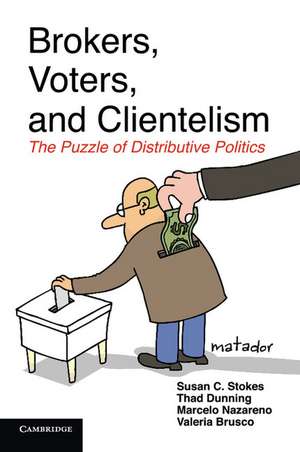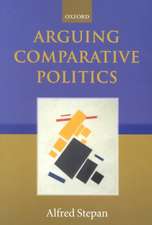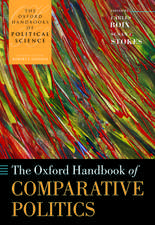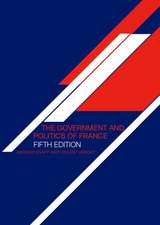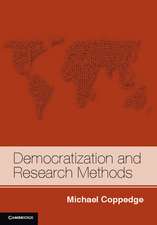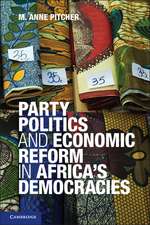Brokers, Voters, and Clientelism: The Puzzle of Distributive Politics: Cambridge Studies in Comparative Politics
Autor Susan C. Stokes, Thad Dunning, Marcelo Nazareno, Valeria Bruscoen Limba Engleză Paperback – 15 sep 2013
| Toate formatele și edițiile | Preț | Express |
|---|---|---|
| Paperback (1) | 274.52 lei 6-8 săpt. | |
| Cambridge University Press – 15 sep 2013 | 274.52 lei 6-8 săpt. | |
| Hardback (1) | 635.41 lei 6-8 săpt. | |
| Cambridge University Press – 22 sep 2013 | 635.41 lei 6-8 săpt. |
Din seria Cambridge Studies in Comparative Politics
-
 Preț: 233.13 lei
Preț: 233.13 lei -
 Preț: 267.61 lei
Preț: 267.61 lei -
 Preț: 239.36 lei
Preț: 239.36 lei -
 Preț: 185.64 lei
Preț: 185.64 lei -
 Preț: 160.82 lei
Preț: 160.82 lei -
 Preț: 206.52 lei
Preț: 206.52 lei - 9%
 Preț: 594.68 lei
Preț: 594.68 lei -
 Preț: 225.70 lei
Preț: 225.70 lei -
 Preț: 164.94 lei
Preț: 164.94 lei -
 Preț: 206.71 lei
Preț: 206.71 lei -
 Preț: 236.42 lei
Preț: 236.42 lei -
 Preț: 358.38 lei
Preț: 358.38 lei -
 Preț: 231.82 lei
Preț: 231.82 lei -
 Preț: 257.82 lei
Preț: 257.82 lei -
 Preț: 264.74 lei
Preț: 264.74 lei -
 Preț: 269.58 lei
Preț: 269.58 lei -
 Preț: 201.24 lei
Preț: 201.24 lei -
 Preț: 232.45 lei
Preț: 232.45 lei -
 Preț: 203.42 lei
Preț: 203.42 lei -
 Preț: 191.12 lei
Preț: 191.12 lei -
 Preț: 158.77 lei
Preț: 158.77 lei -
 Preț: 199.05 lei
Preț: 199.05 lei -
 Preț: 288.80 lei
Preț: 288.80 lei -
 Preț: 388.29 lei
Preț: 388.29 lei -
 Preț: 288.04 lei
Preț: 288.04 lei - 11%
 Preț: 695.06 lei
Preț: 695.06 lei - 11%
 Preț: 553.80 lei
Preț: 553.80 lei -
 Preț: 262.06 lei
Preț: 262.06 lei - 11%
 Preț: 691.66 lei
Preț: 691.66 lei -
 Preț: 228.00 lei
Preț: 228.00 lei -
 Preț: 385.28 lei
Preț: 385.28 lei -
 Preț: 312.89 lei
Preț: 312.89 lei -
 Preț: 224.44 lei
Preț: 224.44 lei -
 Preț: 287.07 lei
Preț: 287.07 lei -
 Preț: 251.27 lei
Preț: 251.27 lei -
 Preț: 313.70 lei
Preț: 313.70 lei -
 Preț: 277.38 lei
Preț: 277.38 lei -
 Preț: 423.79 lei
Preț: 423.79 lei - 11%
 Preț: 552.94 lei
Preț: 552.94 lei - 11%
 Preț: 554.43 lei
Preț: 554.43 lei - 14%
 Preț: 783.26 lei
Preț: 783.26 lei - 11%
 Preț: 584.04 lei
Preț: 584.04 lei -
 Preț: 228.60 lei
Preț: 228.60 lei
Preț: 274.52 lei
Nou
Puncte Express: 412
Preț estimativ în valută:
52.54€ • 57.05$ • 44.13£
52.54€ • 57.05$ • 44.13£
Carte tipărită la comandă
Livrare economică 22 aprilie-06 mai
Preluare comenzi: 021 569.72.76
Specificații
ISBN-13: 9781107660397
ISBN-10: 1107660394
Pagini: 344
Ilustrații: 50 b/w illus. 16 tables
Dimensiuni: 152 x 226 x 23 mm
Greutate: 0.56 kg
Ediția:New.
Editura: Cambridge University Press
Colecția Cambridge University Press
Seria Cambridge Studies in Comparative Politics
Locul publicării:New York, United States
ISBN-10: 1107660394
Pagini: 344
Ilustrații: 50 b/w illus. 16 tables
Dimensiuni: 152 x 226 x 23 mm
Greutate: 0.56 kg
Ediția:New.
Editura: Cambridge University Press
Colecția Cambridge University Press
Seria Cambridge Studies in Comparative Politics
Locul publicării:New York, United States
Cuprins
Part I. Modalities of Distributive Politics: 1. Between clients and citizens: puzzles and concepts in the study of distributive politics; Part II. The Micro-Logic of Clientelism: 2. Gaps between theory and fact; 3. A theory of broker-mediated distribution; 4. Testing the theory of broker-mediated distribution; 5. A disjunction between the strategies of leaders and brokers?; 6. Clientelism and poverty; Part III. The Macro-Logic of Vote-Buying: What Explains the Rise and Decline of Political Machines?: 7. Party leaders against the machine; 8. What killed vote buying in Britain and the United States?; Part IV. Clientelism and Democratic Theory: 9. What's wrong with buying votes?
Recenzii
'This book advances a single broad theoretical point: vote brokers are central to any system of vote buying in mass elections. While many previous scholars have considered the role of vote brokers from one angle or another, what sets this book apart is that it provides a unified theoretical model of vote brokers. It is grounded effectively in the modern economic theory of agency, and the authors run it through a series of tests using both original primary and secondary sources. Brokers, Voters, and Clientelism will be a landmark for the next generation of studies.' Gary W. Cox, Stanford University
'Brokers deserves every bit of attention it will garner … Brokers, Voters, and Clientelism is a model of theoretical precision, conceptual clarity, and impeccable logical reasoning, and its measured inferences, which are supported by exhaustive, careful empirical work, are placed within a proud tradition pioneered by V. O. Key, David Mayhew, Edward Banfield and other intellectual giants who young scholars often do not take the time to read.' Frances Hagopian, Perspectives on Politics
'Brokers deserves every bit of attention it will garner … Brokers, Voters, and Clientelism is a model of theoretical precision, conceptual clarity, and impeccable logical reasoning, and its measured inferences, which are supported by exhaustive, careful empirical work, are placed within a proud tradition pioneered by V. O. Key, David Mayhew, Edward Banfield and other intellectual giants who young scholars often do not take the time to read.' Frances Hagopian, Perspectives on Politics
Notă biografică
Descriere
Brokers, Voters, and Clientelism studies distributive politics: how parties and governments use material resources to win elections.
